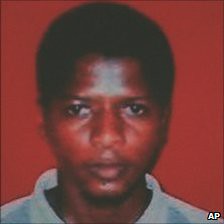Blow to United States Prosecutors As Terror Case Witness Barred

Tanzanian Ahmed Khalfan Ghailani is accused by the United States of being a terrorist and responsible for the August 1998 U.S. embassy bombings in East Africa. A judge has thrown out testimony against him for being coerced.
Originally uploaded by Pan-African News Wire File Photos
Blow to US prosecutors as terror case witness barred
Ahmed Khalfan Ghailani, a native of Tanzania, was arrested in 2004
The judge in the first civilian trial of a former Guantanamo inmate has ruled that a key US government witness cannot testify, in a blow to prosecutors.
Defendant Ahmed Khalfan Ghailani denies helping al-Qaeda kill 224 people in the 1998 US embassy bombings in Africa.The judge ruled the witness could not testify as he had been named by Mr Ghailani while he was "under duress".
A BBC correspondent says the move complicates plans to try Guantanamo detainees in civilian courts.
The Obama administration is hoping to hold such trials for a number of high-profile inmates, including alleged 9/11 mastermind Khalid Sheikh Mohammed.New York Judge Lewis Kaplan postponed Mr Ghailani's trial which had been due to begin on Wednesday.It is now due to open with jury selection on 12 October.
In his ruling, the judge said the proposed government witness had been identified during "statements made by Ghailani to the CIA under duress".The man, Hussein Abebe, was expected to testify he had sold TNT to Mr Ghailani used in the bombing of the US embassy Tanzania in August 1998.This decision, if it stands, is a major setback to the US government's case against Ahmed Khalfan Ghailani, and it complicates the Obama administration's policy of trying Guantanamo detainees in civilian courts.Hussein Abebe was expected to testify that he sold the TNT to Mr Ghailani used in the 1998 bombing of the US embassy in Tanzania.Without him testifying that he sold TNT to Mr Ghailani, the government will struggle to put that evidence in front of the jury.
This presents US prosecutors with an ongoing problem - if evidence obtained in CIA prisons or at Guantanamo is inadmissible in civilian courts, is it possible to get convictions?
A US prosecutor had described Mr Abebe as a "giant" witness for the government, which is considering whether to appeal against the ruling.Mr Ghailani, who is believed to be in mid-30s, was dressed in a grey jumper, dark trousers and a tie as he appeared in court on Wednesday.He is accused of having purchased the vehicle and explosives used in the attack in Tanzania and as having served as an aide to Osama Bin Laden. He denies the charges.Mr Ghailani was held in Pakistan in 2004, taken to a secret CIA facility and then to Guantanamo in 2006.
He was subject to what the government refers to as "enhanced interrogation" by the CIA. His lawyers say he was tortured.The case is seen as a test of the administration's pledge to close the US military base in Cuba by next January.Whereas other detainees have been tried by military commissions, Mr Ghailani is the first Guantanamo prisoner to be tried in the civilian courts.He faces life in prison if convicted.
----------------------------------------------------
The first civilian trial for a Guantanamo Bay detainee has been delayed after a judge told prosecutors they cannot call their star witness.Lewis A Kaplan, the US district judge, blocked the government on Wednesday from calling a man who authorities said, sold explosives to Ahmed Khalfan Ghailani, the defendant.Defence lawyers say investigators only learned about the witness after Ghailani underwent harsh interrogation at a secret CIA-run camp overseas between 2004 and 2006."The court has not reached this conclusion lightly," Kaplan wrote. "It is acutely aware of the perilous nature of the world in which we live. But the constitution is the rock upon which our nation rests. We must follow it not when it is convenient, but when fear and danger beckon in a different direction."The government immediately asked for a delay of the trial, which had been expected to begin with opening statements on Wednesday, so that it has time to appeal the ruling, should it decide to do so.The judge sent a pool of 66 jurors home until Tuesday, but not before warning them to avoid following the case on the news or discussing it with anyone.
Ghailani is charged with conspiring in the 1998 bombings of two US embassies in Africa.The attacks killed 224 people, including a dozen Americans.The judge issued his written three-page ruling after a hearing three weeks ago in which Hussein Abebe, the witness, testified about his dealings with authorities."The government has failed to prove that Abebe's testimony is sufficiently attenuated from Ghailani's coerced statements to permit its receipt in evidence," Kaplan wrote.The defence had asked the judge to exclude Abebe's testimony on the grounds that it would be the product of statements made by Ghailani to the CIA under duress.On that point, Kaplan said, "Abebe was identified and located as a close and direct result of statements made by Ghailani while he was held by the CIA. The government has elected not to litigate the details of Ghailani's treatment while in CIA custody. It has sought to make this unnecessary by asking the court to assume in deciding this motion that everything Ghailani said while in CIA custody was coerced."
The judge noted that he had previously rejected defence motions to dismiss the indictment on the grounds that Ghailani was deprived of a speedy trial and that his treatment by the CIA was so outrageous as to require termination of the charges.

Δεν υπάρχουν σχόλια:
Δημοσίευση σχολίου